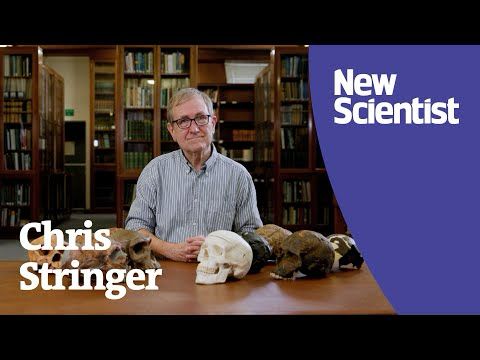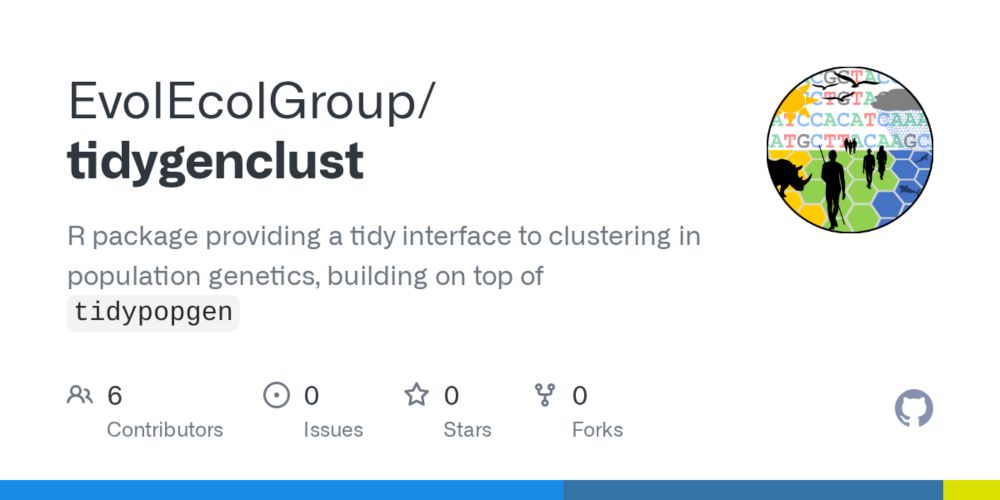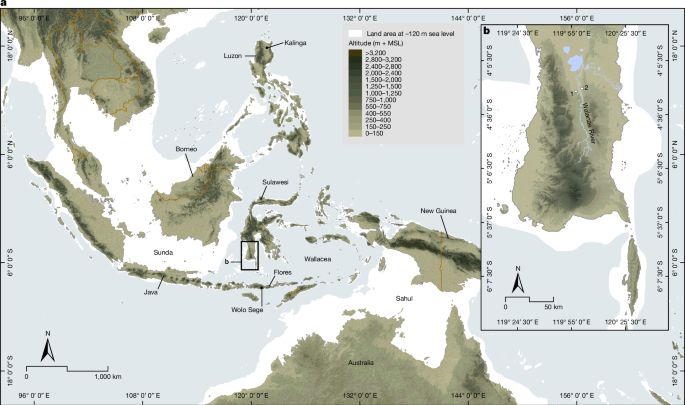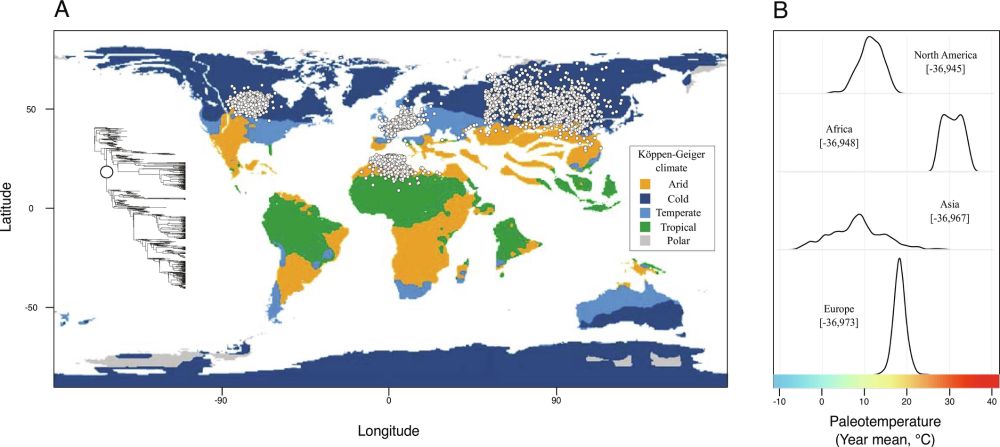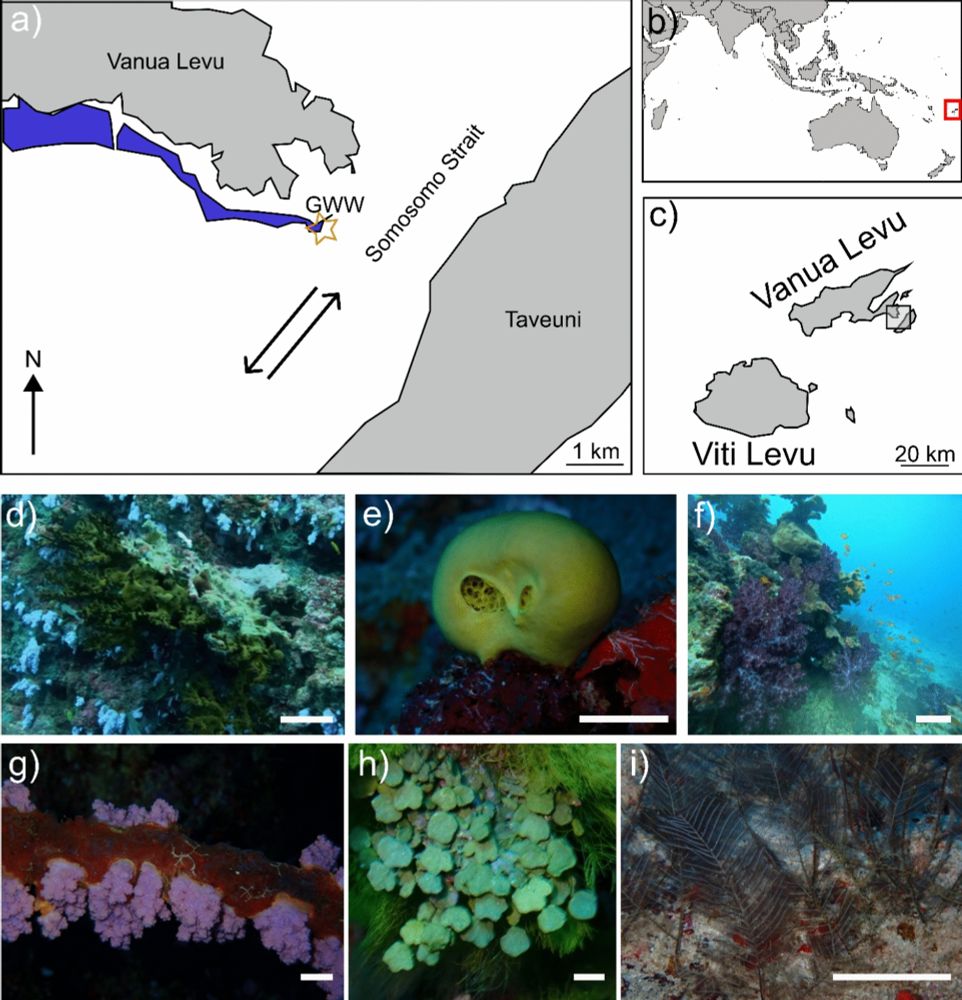
Interbreeding between Neanderthals and modern humans was strongly sex biased
Sex biases in admixture and other demographic processes are recurrent features throughout human evolution. For admixture between Neanderthals and anatomically modern humans (AMHs), sex bias has been p...
Many living people carry fragments of Neanderthal DNA, remnants of ancient interbreeding events, with uneven distribution across chromosomes. New work by @sarahtishkoff.bsky.social lab suggests patterns are most consistent with Neanderthal contribution to human populations being highly male biased.🧪
26.02.2026 19:27 —
👍 58
🔁 25
💬 5
📌 0


New paper alert! 🚨 🐌
We studied historic Antarctic fossils from the Zinsmeister Collection to assess whether the K-Pg extinction, as recorded on Seymour Island, was sudden or gradual. We found that benthic life thrived in the 4 million years before the K-Pg.
doi.org/10.1016/j.pa...
13.12.2025 10:51 —
👍 42
🔁 18
💬 2
📌 2
Population genomics: background and tools
Study methods in population genomics have been profoundly reshaped in the last few years, fostered by the rapid growth of DNA sequence production and sharing. This unprecedented opportunity has led t…
EMBO Population Genomics course: Are you a postgrad student or a postdoc starting a population genomics project? This course aims to give you the tools to answer questions for your project. Registration deadline: 10 February 2026 meetings.embo.org/event/26-pop... #EMBOpopgen
14.12.2025 14:49 —
👍 6
🔁 4
💬 0
📌 0

SoS 257: Repensando los primeros pasos de nuestra especie con Cecilia Padilla Iglesias
Esta semana, en "Sausage of Science" de @humbioassociation.bsky.social, hablo sobre mi, y sobre cómo el proyecto que hicimos en @eegcam.bsky.social cambia nuestra visión sobre el origen de nuestra especie en África 🤗https://open.spotify.com/episode/1aQzqEBgILUm2DQUmWWrmS?si=EcGBdjvHROaSd5ges_V9Zg
18.11.2025 18:00 —
👍 7
🔁 2
💬 1
📌 0
Huge congratulations to Zhe and everyone involved! 😊
08.10.2025 11:20 —
👍 4
🔁 2
💬 0
📌 0
This has been a wonderful effort by many lab members, and the credits for the fantastic leopard picture go to Ondra Pelanek 📷
07.10.2025 21:33 —
👍 0
🔁 0
💬 0
📌 0
Lastly, we saw that Europe also followed this pattern: during warm interglacial periods it was occupied by leopards but population sizes dropped during glacial periods, suggesting that the effect of climate could have been strong enough to catalyse their extinction.
07.10.2025 21:31 —
👍 2
🔁 0
💬 1
📌 0

We also found that climate stability over glacial cycles can explain the different levels of differentiation on continents. Africa remained stable over time, whilst Asian demography fluctuated more through glacial cycles, hence creating the isolation for needed for differentiation.
07.10.2025 21:31 —
👍 2
🔁 1
💬 1
📌 0

This simulated demography provided explanations to many patterns we observe. For example, African leopards show strong isolation from almost all Asian ones, and we found it is due to the shallow corridor between North Africa, the Levant and the Arabian Peninsula after the initial expansion.
07.10.2025 21:31 —
👍 2
🔁 0
💬 1
📌 0
We found that a simple Out of Africa model can capture the genetic diversity of leopards in Asia and Africa. Among all the demographic parameters, the ones associated with climate showed strongest signal, indicating climate was largely responsible for contemporary leopard demography.
07.10.2025 21:31 —
👍 2
🔁 0
💬 1
📌 0
Why is there only one subspecies in Africa whilst in Asia there are 8? And why did leopards disappear in Europe? In our study, we combine genetics, climate and archaeological data to build a Climate Informed Spatial Genetic Model and try to answer these questions.
07.10.2025 21:31 —
👍 4
🔁 0
💬 1
📌 0

#newpreprint: "Climate Shaped the Global Population Structure of Leopards and their Extinction in Europe": www.biorxiv.org/content/10.1...! Leopards are charming big cats but there are many mysteries around them. Thread 🧵
07.10.2025 21:31 —
👍 35
🔁 16
💬 1
📌 3

Birds all over the world use the same sound to warn of threats
The findings of a new study about communication between birds also offer key insights into the origins of language.
#newpaper out in @natecoevo.nature.com on Learned use of an innate sound-meaning association in birds, co-led by @jameskennerley.bsky.social when he was a PhD student at @eegcam.bsky.social . Nice summary on the @uk.theconversation.com theconversation.com/birds-all-ov...
05.10.2025 17:03 —
👍 21
🔁 6
💬 0
📌 2
YouTube video by New Scientist
Our common Neanderthal ancestor could be a million years old, says Chris Stringer
youtube.com/watch?v=MA1c...
27.09.2025 10:11 —
👍 85
🔁 23
💬 7
📌 0
I couldn’t be more excited about being given the chance to present some of the work we do at @eegcam.bsky.social this November & to listen to the talks by such an incredible line up of speakers! 🤩
28.08.2025 17:09 —
👍 19
🔁 5
💬 0
📌 0

Malaria shaped human spatial organisation for the last 74 thousand years - preLights
The distribution of early human settlements in Sub-Saharan Africa might have been influenced by avoidance of mosquitoes that spread malaria
The distribution of early human settlements in Sub-Saharan Africa might have been influenced by avoidance of mosquitoes that spread malaria
A new #prelight of Alejandra Leffer's group talks about the preprint by @margheritac17.bsky.social , and the team.
20.08.2025 10:43 —
👍 8
🔁 2
💬 0
📌 1
Thank you @prelights.bsky.social & Alejandra Leffer's group for choosing our preprint on @biorxiv-evobio.bsky.social and for this chance to talk about human- #malaria coevolution!🦟
@eegcam.bsky.social @elliescerri.bsky.social @MPI_GEA
22.08.2025 12:47 —
👍 16
🔁 9
💬 0
📌 0
3 exciting job opportunities at the new "HUMAN ORIGINS" Cluster of Excellence at Tübingen, for which I am an external PI. We are looking for early career researchers ready to launch their independent group and ask some exciting questions!
18.08.2025 19:44 —
👍 7
🔁 4
💬 0
📌 0

tidygenclust: Clustering for Population Genetics in R
Background Population structure analysis is crucial for evolutionary research and medical genomics. Clustering methods, broadly categorized as model-based (e.g. ADMIXTURE) or non-model-based (e.g. SCO...
🚨🧬New #preprint and R package from the lab out in @biorxivpreprint.bsky.social🧬🚨: 'tidygenclust' combines the functionality of ADMIXTURE, fastmixture and Clumppling into R - allowing for reproducible clustering analyses and plotting all in one place!
www.biorxiv.org/content/10.1...
07.08.2025 09:49 —
👍 19
🔁 5
💬 1
📌 0

A multi-model approach to the spatial and temporal characterization of the African Humid Period
During the last c. 20,000 years, African climates experienced temperature shifts related to the last period of global deglaciation and moisture availa…
#Newpaper: the African Humid period through the lenses of pollen-based and mechanistic-based #palaeoclimate reconstructions!
Thanks @ecologypast.bsky.social, @markuslfischer.bsky.social, @paleoclimategirl.bsky.social and all coauthors!
28.07.2025 06:45 —
👍 9
🔁 3
💬 0
📌 0
ScienceDirect.com | Science, health and medical journals, full text articles and books.
Pollen-based reconstructions and a mechanistic climate model tell a similar story on the Africa Humid Period; @mikleonardi.bsky.social and Andrea contributed to a proxy-model comparison paper led by @ecologypast.bsky.social in Quatern. Int.: authors.elsevier.com/sd/article/S...
25.07.2025 13:38 —
👍 2
🔁 1
💬 0
📌 0
TODAY!!
19.07.2025 06:39 —
👍 22
🔁 5
💬 2
📌 0










